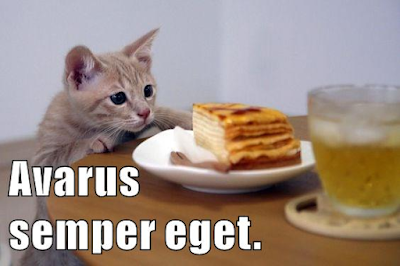Today you will learn some 2nd-conjugation verbs which have "e" as their theme vowel:
- manet: she / he / it remains, stays
- olet: she / he / it stinks, smells
- eget: she / he / it needs, lacks
- mordet: she / he / it bites, gnaws
And here are today's proverbs:
1. Cicatrix manet.
(The) scar remains.
ci-CA-trix manet
The Latin noun cicatrix, "scar," is used in medical English: "cicatrix," "cicatrize," etc.
The Latin verb manet, "remain, stay," is the origin of English "remain," "remnant" (via the Latin compound re-manet).
The idea here is that a scar can remain even after a physical wound is healed and, metaphorically, the same is true of an emotional wound: there can be a metphorical "scar" that remains to remind you of the experience.
2. Pecunia non olet.
Money doesn't stink.
pe-CU-nia non olet
The verb olet, "stink, smell," is at the root of English "olfactory."
This saying has a Wikipedia article of its own: Pecunia non olet. The story goes that the emperor Vespasian had imposed a tax on the urine collected from the public urinals in the city of Rome (the urine was collected and sold to tanners, launderers, etc. who used it as a source of ammonia). When Vespasian's son Titus complained that this was a disgusting source of money, Vespasian held up a coin and asked, "Does this stink?" Titus admitted that the coin did not stink: Pecunia non olet.
Check out the Wikipedia article for lots of examples of how this saying has been used in literature over the centuries!
3. Sapiens non eget.
(The) wise (man) doesn't lack (anything).
SA-piens non eget
The verb eget, "lacks, needs," is the root of English "indigent."
3. Sapiens non eget.
(The) wise (man) doesn't lack (anything).
SA-piens non eget
The verb eget, "lacks, needs," is the root of English "indigent."
The idea is that someone who is wise has everything that they need: using their intelligence, they can make up for any lack. For a story that illustrates this saying, see the Aesop's fable about the poet Simonides (and a similar story is told about the Socratic philosopher Aristippus being shipwrecked).
4. Avarus semper eget.
(The) greedy (man) always lacks (something).
a-VA-rus semper eget
This saying features the verb eget again, so that means you already know all the words in this one! This saying contrasts the wise man who needs nothing with the greedy man who is always lacking something and is never satisfied. Compare the saying you saw earlier: Avarus semper est pauper.
5. Canis mortuus non mordet.
(A) dead dog doesn't bite.
canis MOR-tuus non mordet
The masculine adjective, mortuus, "dead," agrees with the masculine noun canis. You've already seen the noun mors (stem mort-), "death," and you can see this root in English "mortuary" and "mortify."
4. Avarus semper eget.
(The) greedy (man) always lacks (something).
a-VA-rus semper eget
This saying features the verb eget again, so that means you already know all the words in this one! This saying contrasts the wise man who needs nothing with the greedy man who is always lacking something and is never satisfied. Compare the saying you saw earlier: Avarus semper est pauper.
5. Canis mortuus non mordet.
(A) dead dog doesn't bite.
canis MOR-tuus non mordet
The masculine adjective, mortuus, "dead," agrees with the masculine noun canis. You've already seen the noun mors (stem mort-), "death," and you can see this root in English "mortuary" and "mortify."
The verb mordet, "bites," is a word you've seen before as a participle: mordens, "biting." As you'll learn later, it's easy to form the participle when you know the verb: mordet, "bites," gives mordens, "biting," and latrat, "barks," gives latrans, "barking," etc.
This saying is literally true, but metaphorically it refers to any situation where a former danger is now defunct and no longer a threat.
Here's a recap:
And here is today's audio:
Plus the LOLCats!
This saying is literally true, but metaphorically it refers to any situation where a former danger is now defunct and no longer a threat.
Here's a recap:
- Cicatrix manet.
- Pecunia non olet.
- Sapiens non eget.
- Avarus semper eget.
- Canis mortuus non mordet.
Plus the LOLCats!





No comments:
Post a Comment
Comments are limited to Google accounts. You can also email me at laurakgibbs@gmail.com